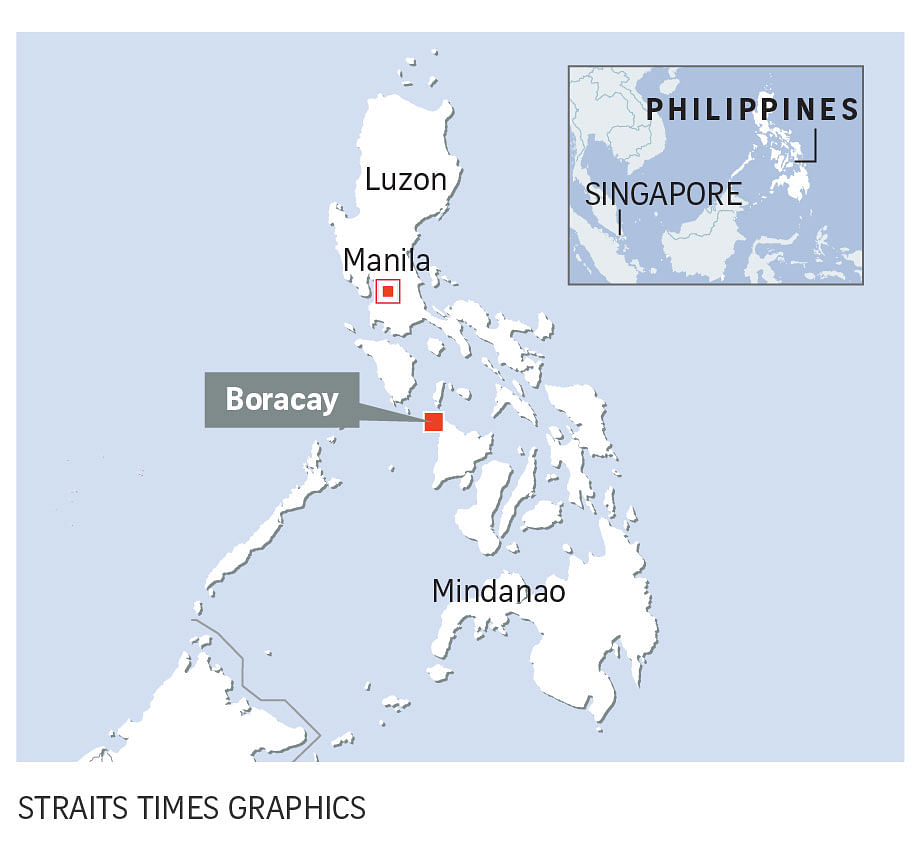Philippines to close Boracay to tourists for six months from April 26
Sign up now: Get ST's newsletters delivered to your inbox
Follow topic:
MANILA - The resort island of Boracay will be closed to tourists for six months from April 26 to fix sewage and environment-related problems that have led President Rodrigo Duterte to describe it as a "cesspool".
Mr Duterte approved the recommendation by three government agencies to shut down Boracay, his spokesman Harry Roque told reporters late on Wednesday (April 4).
The go-ahead was given despite pleas to carry out the shutdown in phases and to limit its scope.
About two million tourists visited Boracay last year.
More than 36,000 hotel and resort workers, as well as masseuses, tattoo artists and vendors stand to lose their jobs, according to Boracay Foundation, a non-profit. Seven in 10 workers in Western Visayas, a region in central Philippines, are in Boracay.
The closure will cost the island's tourism sector some 56 billion pesos (S$1.4 billion) if it lasts for a year. Eleven hotels have said their combined losses can run up to 550 million pesos a year.
Airlines have advised their passengers that their bookings may be affected by the closure. Philippine Airlines has said it will refund customers, help them rebook, or reroute affected flights.
Tourists have already been cancelling bookings.
The Department of Tourism has ceased marketing Boracay and is instead promoting alternative destinations in Western Visayas.
Mr Duterte called Boracay a "cesspool" in a speech in February, and threatened to shut it down for at least six months.
"You go into the water, it's smelly. Smells of what? Sh*t," he had said.
He also said unless something was done, "there will be a time that no more foreigner will go (to Boracay) because he, when he goes back to where he belongs, he will be full of sh*t, going back and forth to the restroom".
Boracay's degradation has been blamed on the failure of the local government to enforce ordinances on marine conservation, garbage and sanitation, and zoning and construction, among others.
At least 300 hotels, resorts and inns have been ignoring an ordinance that requires them to build their own sewage and wastewater treatment facilities. They have instead been dumping waste into canals meant only for rainwater and surface overflow.
Such malpractices have led to an increase in the coliform bacteria level, which indicates fecal contamination and can cause diarrhoea, in waters around Boracay, and longer episodes of algal bloom.
Four of the nine wetlands on the island, meanwhile, are occupied by a shopping mall, a hotel and around 100 illegal settlers.

The government's economic planners said the six-month closure will barely have an impact on tourism-driven growth.
Mr Reynaldo Cancio, a director at the National Economic and Development Authority, said revenues from Boracay accounted for just 0.1 per cent of gross domestic product.
Boracay, famous for its powdery white sand and shallow azure water, was named the best island resort by magazine publisher Conde Nast in 2016.
It was ranked second out of 25 beaches in Asia and 24th in the world in TripAdvisor's 2018 Travellers' Choice Awards.

